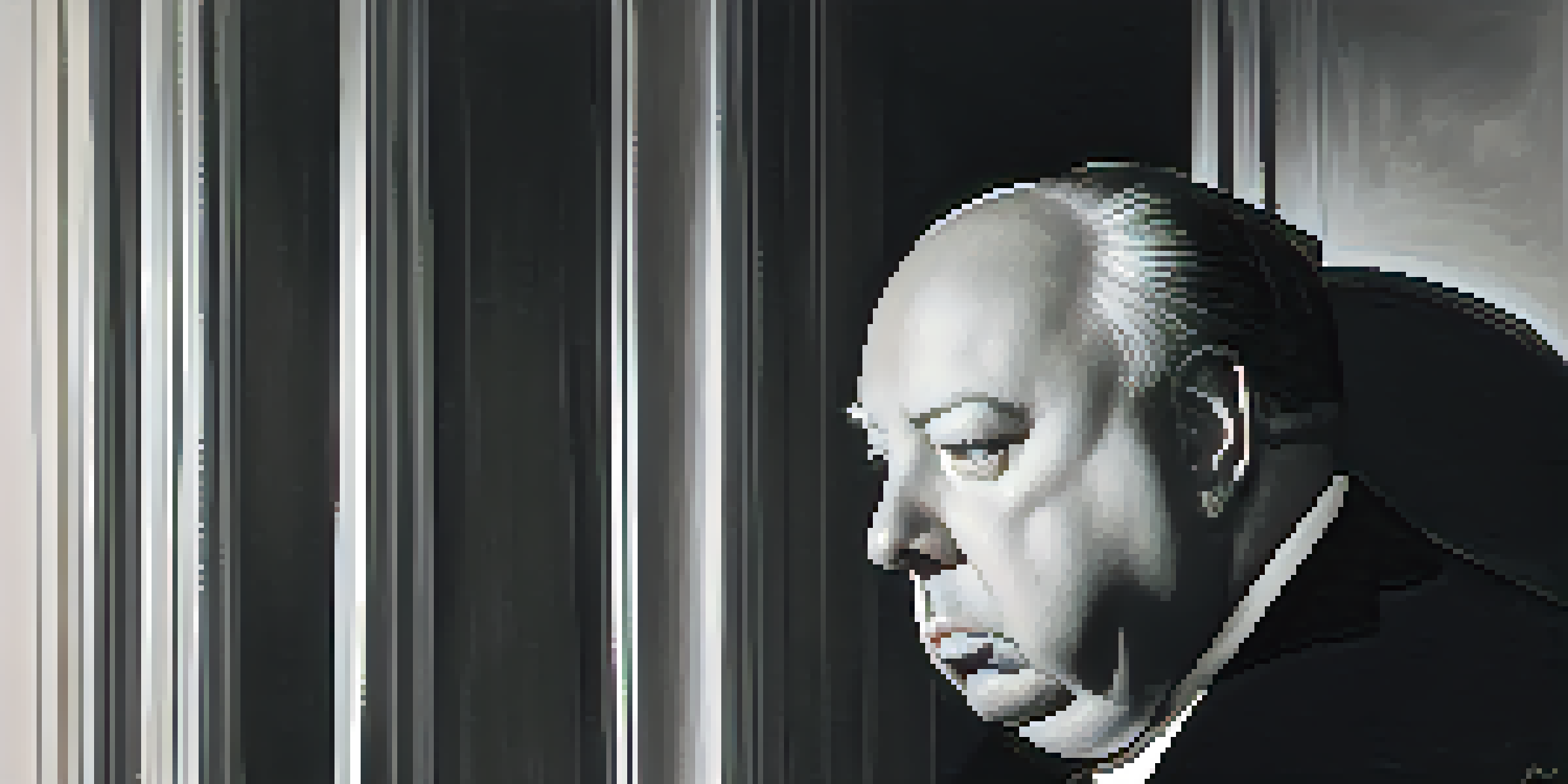Exploring Alfred Hitchcock: The Master of Suspense in Cinema

The Early Life of Alfred Hitchcock: A Glimpse into Genius
Alfred Hitchcock, often called the Master of Suspense, was born in 1899 in London. Growing up in a strict household, he experienced a childhood filled with fear and isolation, which would later influence his cinematic themes. His fascination with storytelling began early, leading him to pursue a career in film that would redefine the thriller genre.
There is no terror in the bang, only in the anticipation of it.
After studying engineering and working in the film industry as a title card designer, Hitchcock quickly moved up the ranks. His early films in the silent era, such as 'The Lodger' (1927), showcased his innovative visual style and ability to create tension. This was just the beginning of a career that would span over six decades and change the landscape of cinema.
Hitchcock's unique perspective on fear and suspense was shaped by his experiences, making his films deeply relatable. His childhood fears translated into iconic scenes that resonate with audiences even today. This foundation would become the bedrock for his legacy as a master storyteller.
Signature Techniques: The Art of Suspense
Hitchcock’s films are often characterized by his ingenious use of suspense—a technique he famously termed 'suspense versus surprise.' He believed that the audience should be aware of the danger lurking in a scene, creating a sense of dread that heightens the experience. This can be seen in classics such as 'Psycho' and 'Rear Window,' where the viewer is kept on edge, anticipating what will happen next.

Another hallmark of Hitchcock's style is his meticulous attention to detail and visual storytelling. He often employed innovative camera angles and editing techniques to evoke emotions. For example, the iconic shower scene in 'Psycho' is not just shocking; it is masterfully constructed to elicit maximum tension without showing explicit violence.
Hitchcock's Early Life Shaped Films
Alfred Hitchcock's strict upbringing and childhood fears profoundly influenced his storytelling and themes of suspense.
Furthermore, Hitchcock's use of sound and music played a significant role in crafting suspense. The haunting strings of Bernard Herrmann in 'Psycho' are a perfect example of how sound can amplify fear. His innovative techniques have influenced countless filmmakers, leaving a lasting impact on the thriller genre.
Iconic Films: A Journey Through Hitchcock's Masterpieces
Hitchcock's filmography is filled with iconic works that have stood the test of time. 'Psycho' (1960) is arguably his most famous film, known for its shocking plot twists and unforgettable characters. This film not only revolutionized the horror genre but also redefined audience expectations about storytelling in cinema.
What is drama but life with the dull bits cut out?
Another masterpiece, 'Vertigo' (1958), showcases Hitchcock's ability to weave complex narratives. This film, often cited as one of the greatest of all time, delves into themes of obsession and identity. Its innovative use of visual effects, particularly the dolly zoom, left a profound impact on the film industry.
Films like 'North by Northwest' and 'The Birds' further cemented Hitchcock's reputation as a master of suspense. Each film is a testament to his skill in crafting tension and engaging narratives. Collectively, they not only entertain but also invite audiences to explore deeper psychological themes.
The Influence of Hitchcock on Modern Cinema
Alfred Hitchcock's influence on modern cinema is monumental. Directors like Steven Spielberg, Martin Scorsese, and Christopher Nolan have cited him as a major inspiration in their work. His techniques of building suspense and developing complex characters have shaped contemporary storytelling in profound ways.
For instance, films like 'Seven' and 'Gone Girl' reflect Hitchcockian elements, particularly in their psychological tension and unexpected twists. These films echo Hitchcock's mastery of suspense, showing that his legacy continues to thrive in today's cinematic landscape. His ability to explore the darker aspects of human nature remains relevant.
Master of Suspense Techniques
Hitchcock's unique techniques, such as suspense versus surprise and innovative sound design, revolutionized the thriller genre.
Moreover, the rise of streaming services has allowed a new generation to discover Hitchcock's work. As classic films are revisited and analyzed, his influence is evident in the storytelling techniques of today's filmmakers. Hitchcock's contributions have not only endured but have also evolved, keeping his genius alive in modern cinema.
Psychological Themes: Exploring the Human Psyche
One of the most compelling aspects of Hitchcock's films is their exploration of psychological themes. He delved into the complexities of the human mind, often portraying characters grappling with fear, guilt, and obsession. This psychological depth adds layers to his narratives, making them more than just thrillers.
In films like 'Spellbound' (1945), Hitchcock tackled themes of psychoanalysis, incorporating dream sequences that reveal the inner workings of the mind. The blending of psychological concepts with suspense was groundbreaking and has influenced the way psychological thrillers are crafted today. Audiences are drawn to these complex characters, making them relatable and believable.
By presenting flawed characters with dark motivations, Hitchcock invites viewers to reflect on their own fears and desires. This exploration of the human psyche creates a sense of empathy, even for the most sinister characters. Hitchcock’s ability to make audiences confront uncomfortable truths about themselves is a hallmark of his storytelling prowess.
Hitchcock's Legacy: An Enduring Impact on Film and Culture
Alfred Hitchcock's legacy extends far beyond his films; it has permeated popular culture and influenced various artistic forms. His unique style and themes can be seen in literature, television, and even video games. The 'Hitchcockian' trope has become a standard reference point for suspense and thriller narratives.
Moreover, Hitchcock's work has sparked endless analysis and academic discussion. Film studies often focus on his techniques and themes, highlighting his role in shaping modern cinema. Documentaries and books explore his life and work, ensuring that new generations can appreciate his genius.
Enduring Influence on Modern Cinema
Hitchcock's legacy continues to inspire contemporary filmmakers, evident in the psychological depth and suspenseful narratives of modern films.
Hitchcock's ability to engage audiences emotionally and psychologically makes his films timeless. As long as stories are told on screen, his influence will continue to resonate. His mastery of suspense has set a standard that filmmakers strive to achieve, solidifying his place as a true pioneer in cinema.
Conclusion: Celebrating the Master of Suspense
In summary, Alfred Hitchcock's contributions to cinema are immeasurable. His ability to weave suspenseful narratives, explore psychological themes, and innovate filmmaking techniques has left an indelible mark on the industry. As audiences continue to enjoy his films, the essence of his storytelling remains alive.
Hitchcock's legacy serves as a reminder of the power of film to evoke emotion and provoke thought. His unique vision has inspired countless filmmakers and continues to influence the art of storytelling today. By exploring his life and work, we can appreciate not only the films but the man behind the camera.

Ultimately, celebrating Hitchcock is about recognizing his role as a master of suspense and a pioneer of cinematic art. His films invite us to experience fear and excitement, reminding us of the thrill of storytelling. As we explore his works, we keep the spirit of Alfred Hitchcock alive in our hearts and minds.